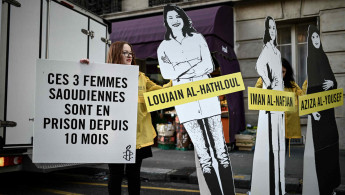Third 'show trial' of Saudi women activists ends without release or verdict
A third "show trial" hearing for the eleven Saudi women activists detained for almost a year concluded on Wednesday without a verdict or bail for eight of them, campaigners said, following the provisional release of three of the accused last week.
Some of the women, on trial on charges of contacting foreign media, diplomats and human rights groups, have said they have faced torture and sexual abuse after being detained in a wide-ranging crackdown on dissent under the direction of Saudi Arabia's de-facto ruler and Crown Prince Mohammed Bin Salman.
The charges have been labeled "bogus" by rights watchdog Amnesty International.
Blogger Eman al-Nafjan, retired university lecturer Aziza al-Youssef and preacher Rokaya al-Mohareb were seen hugging one another as they entered the courthouse after being granted provisional release last Thursday.
The three freed women and their bail guarantors were forced to sign a pledge that they will stay away from the media, multiple people with access to the trial said.
Their release had prompted expectations that the other women would soon be freed, but Wednesday's hearing concluded without a decision from the three-judge panel.
"The third trial session for the Saudi women activists has ended with NO VERDICTS against any of them, and with no temporary release to any of them," Prisoners of Conscience, a Saudi group that tracks political prisoners, tweeted.
While there was no immediate comment from the court, which has blocked access to foreign reporters and diplomats, the development was corroborated by multiple activists and people with access to the trial.
Some of the activists may expect to receive a verdict in their next hearing, scheduled for April 17, London-based rights groups ALQST said.
Most of the activists, many of whom were long-time campaigners for women's right to drive in the ultraconservative kingdom, were arrested last summer in a sweeping crackdown just before the lifting of the decades-long ban on female motorists.
The outspoken siblings of one of the prominent detainees, activist Loujain al-Hathloul, said they were being pressured by people close to the Saudi regime to stay silent over accusations of their sister’s torture in detention.
Alia and Waleed al-Hathloul, both of whom live outside of Saudi Arabia, have maintained an active social media presence after allegations of Hathloul's torture first came to light. They have also published op-eds in prominent Western newspapers, such as The New York Times.
"Pressure from all sides to remain silent," Alia tweeted, without naming anyone.
"We were silent and the worst kinds of torture happened while we were silent. I can shut up but only when Loujain is with us and those who tortured her are put on trial."
Some women reportedly broke down as they accused interrogators of subjecting them to electric shocks, flogging and groping in detention in a court hearing last week.
Those allegations, previously detailed by Amnesty and Human Rights Watch, were rejected by a Saudi prosecutor on Wednesday, witnesses said.
Some detainees, including Loujain, were recently forced to sign letters requesting a royal pardon from King Salman.
Many close to the Saudi establishment, as well as activists familiar with regime tactics,have warned public criticism by family members could prolong the women’s detention.
"One of the issues I believe Saudi is grappling with... is not to be seen to be buckling to Western pressure," Ali Shihabi, founder of pro-Saudi think tank Arabia Foundation, tweeted last week.
"[It] can only delay their release."
Officials accused the women of links to foreign intelligence agencies at the time of their arrest, while state-allied media branded them traitors and "agents of embassies".
Initially due to be tried in terrorism courts, the activists were moved to a criminal court at the last minute before their first hearing in what many have dubbed "show trials".
Their charge sheets do not mention contact with foreign spies, campaigners who have reviewed the documents say.





 Follow the Middle East's top stories in English at The New Arab on Google News
Follow the Middle East's top stories in English at The New Arab on Google News

![22 Arab countries at COP29 have rejected the targeting of fossil fuels [Getty]](/sites/default/files/styles/image_330x185/public/2024-11/GettyImages-2184289638.jpg?h=199d8c1f&itok=ptHl5bec)
![Dozens of people turned out for the funerals [Getty]](/sites/default/files/styles/image_330x185/public/2024-11/GettyImages-2185229760.jpg?h=e7c891e8&itok=1bctDcE6)